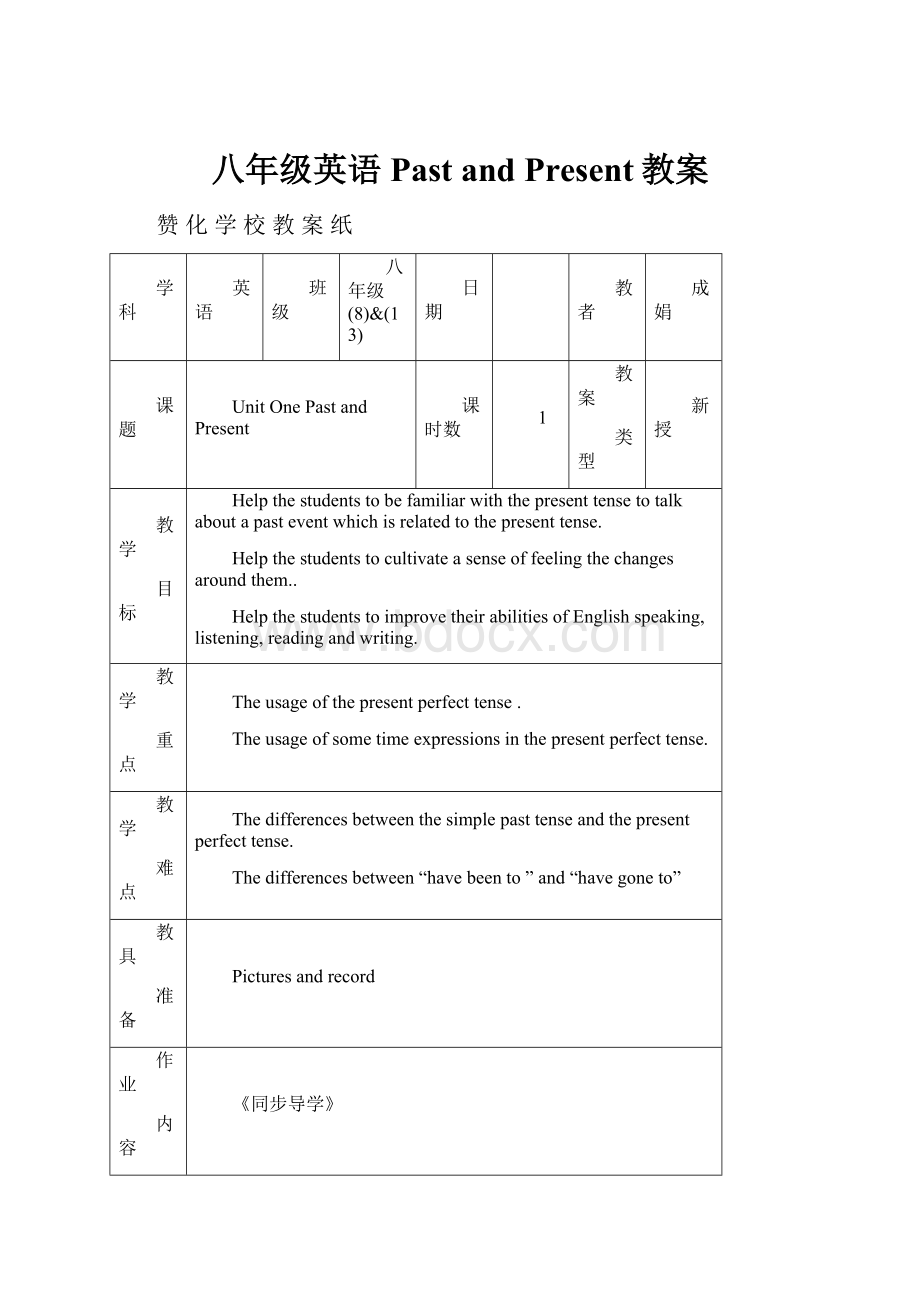八年级英语Past and Present教案.docx
《八年级英语Past and Present教案.docx》由会员分享,可在线阅读,更多相关《八年级英语Past and Present教案.docx(12页珍藏版)》请在冰豆网上搜索。

八年级英语PastandPresent教案
赞化学校教案纸
学科
英语
班级
八年级(8)&(13)
日期
教者
成娟
课题
UnitOnePastandPresent
课时数
1
教案
类型
新授
教学
目标
Helpthestudentstobefamiliarwiththepresenttensetotalkaboutapasteventwhichisrelatedtothepresenttense.
Helpthestudentstocultivateasenseoffeelingthechangesaroundthem..
HelpthestudentstoimprovetheirabilitiesofEnglishspeaking,listening,readingandwriting.
教学
重点
Theusageofthepresentperfecttense.
Theusageofsometimeexpressionsinthepresentperfecttense.
教学
难点
Thedifferencesbetweenthesimplepasttenseandthepresentperfecttense.
Thedifferencesbetween“havebeento”and“havegoneto”
教具
准备
Picturesandrecord
作业
内容
《同步导学》
教学
后记
赞化学校教案纸
教学过程
分课时计划(内容、课型、步骤、方法)
附记
WelcometotheUnitPeriodOne
1.Startthislessonwithaquiztoseeifthestudentsarefamiliarwithtransportvocabulary.Askthestudentstokeeptheirbooksclosed.ReadthefollowingsentencesandaskstudentstoguesswhichmodeloftransportIamdescribing.
IthastraveledacrossVictoriaHarbour,betweenHongKongIslandandKowloonsince1898.(StarFerry)
Itisaneasywaytogettothetopofthepeak.(peaktram).
Therearemanyofthem.EachhaswheelsandtakesyoutomanyplacesinandaroundHongKong.(bus)
Ithasprovidedtransportserviceforpeoplelivinginthenorth-westNewTerritoriessince1988.(lightrail)
ItisthefastestwayoftravelingandwasintroducedtoHongKongin1925.(plane)
Thousandsofpeopletraveltoworkoniteveryday.
2.ReadthecontestofPartAandexpandonittocreateinterest.Linkittopersonalexperiencesandtalkabouttheconveniencesandefficiencyofdifferentmodesoftravel.
3.Askthestudentstowriteinthenamesoftheformsoftransportunderthepictures.
4.AskthestudentstolookatthetimetableinPartB.Tellthemtowriteinthenamesoftheformsoftransportonthecorrectpointsonthetimeline.
5.Withthedefinitefacts,talkaboutthedifferencesbetweenthesimplepasttenseandthepresentperfecttense.
Peoplebegantousethelightrailin1988.
Peoplehaveusedthelightrailsince1988.
Askthestudentstotellthedifferences.Thenaskotherstudentstomakemoresentencesusingpresentperfecttense.
6.AskthestudentstolookatthepicturesorthecomicstripsandanswerwhatdoesnotHobolookhappy?
AskthestudentstolistentothedialoguebetweenHoboandEddie,thentellwhathappenedbetweenthem.Askthestudentstofindoutthesentencesinthepresentperfecttense.Findoutiftheyhavemastereditwell.Letthestudentstopracticethedialogueandthentrytoactitout.
7.Homework
Finishtheexercisesin《同步导学》
赞化学校教案纸
教学过程
分课时计划(内容、课型、步骤、方法)
附记
赞化学校教案纸
教学过程
分课时计划(内容、课型、步骤、方法)
附记
Reading1PeriodTwo
Step1Translation
1.Peoplehaveusedtramsince1904.
2.IhavestudiedinZanhuaSchoolforabout2years.
3.ThisteacherhastaughtEnglishformorethantwentyyears.
4.HaveyoulivedinGaoyousinceyouwereborn?
5.HaveyouReadthebooknamed“Gonewiththewind”?
6.Hashehadhisbreakfast?
No,hehasn’thadanythingyet.
Step2Presentation
AskthestudentsiftheyfindanychangesinGaoyou.Talkaboutthechangeswiththewholeclass.
AskthestudentsiftheyhavebeentoKowloonWalledCityParkinHongKong.AskthemwhattheyknowaboutthehistoryoftheKowloonWalledCity.Ifpossible,Iwillaskthestudentstopreparesomeinformationaboutthecity.
Step3Reading
Askthestudentstoreadtheinterviewandaskstudentstofollowalongintheirbooks.Askstudentstounderlineanywordstheydonotunderstandandguesstheirmeaningsfromthetext.
Afterreading,AskthestudentstoopentheirbookstoPage6anddosomeTorFexercises.
1.MrDongknowstheKowloonWalledCityverywell.T
2.HemovedintotheKowloonWalledCityin1960.F
3.Hegotmarriedin1991.F
4.WhenMrDongmarried,hemovedoutoftheKowloonWalledCity.F
5.Inthepast,30,000peoplelivedintheKowloonWalledCity.T
6.MrDongandhisoldfriendsmeetintheKowloonWalledCityParktoplaycardsandChinesechess.T
7.TheKowloonWalledCityisnoisierthanitwasbefore.F
8.MrDonglikestheopenspaceandprettygardensinthepark.T
Step4Re-reading
Askthestudentstoreadthetextafterthetape,thenencouragethemtofinishtheexerciseonPage7
Step5ThePresentPerfectTense
1.HowlonghaveyouknowntheKowloonWalledCity?
2.I’veknowntheplaceformanyyears.
3.IhaveknownitsinceIwasveryyoung.
4.Hastheplacemovedchangedalot?
5.Now,theplacehasturnedintoapark.
6.Ithasbecomemoredifficulttoseemyoldfriends.
7.ManyofthemhavemovedtootherareasandIfeelabitlonelyfromtimetotime.
Homework
Finishofftheexercisesin《同步导学》
赞化学校教案纸
教学过程
分课时计划(内容、课型、步骤、方法)
附记
赞化学校教案纸
教学过程
分课时计划(内容、课型、步骤、方法)
附记
Reading2Period3
1.Lily’grandfather,MrDong,cametoBeijingtovisither.
(!
)visit作及物动词,其后可接人或地点作宾语。
e.g.,HevisitedChinalastyear.
IoftenvisitmyfriendsonSunday.
(2)make/payavisitto为习惯表达,意为“参观,拜访”此时它是名词。
(3)onavisitto为“访问某人,参观某地或在某人家做客”
2.HeusedtoliveinthekowloonWalledCityinHongKong.
英语中,usedto后既可接行为动词也可接表示状态的动词原形,主要是同现在相比较,说明过去常常如此,而现在不是这样了。
Sheusedtobeahistoryteacher.
Mymotherusedtogetupearlywhenshewasyoung.
usedto的否定形式一般用didn’tuseto,其疑问形式用Didsbuseto。
Hedidn’tusetodrinkbeer.=Heusedn’ttodrinkbeer.
DidsheusetobeanEnglishteacher?
=UsedshetobeanEnglishteacher?
3.Infact,IwasbornthereandhaveknownitsinceIwasyoung.
infact意为“事实上”
e.g.,IsaiditwasTuesday,butinfactitwasMonday.
beborn意为出生。
Manybabiesareborninthishospital.
Thebabywasbornonacoldmorning.
4.So,haveyouactuallylivedintheKowloonWalledCity?
这么说,你居然在九龙城寨住过?
Actually是副词,意为“实际上,竟然,居然”等。
Didyouactuallyseethetrafficaccident?
5.Welivedtotogetheruntil1960whenIgotmarried.
Theywalkeduntilitgotdark.
WetalkedhappilyuntilMrWutoldustobequiet.
married此处是形容词,意为“结了婚的”,常在系动词be和get后作表语。
构成bemarriedto意为与某人结婚,常用来表示婚姻的状态。
e.g.,Shegotmarriedtoahandsomeman.
6.Now,theplacehasturnedintoapark.
(!
)句中的turn是动词,意为“变成,改变”,与become意思相近。
e.g.,Atalowtemperature,waterturnstoice.
Hewasateacherwhenhewasyoung,butheturnedintoawriterwhenhegotolder.
(2)turninto意为“变成了”或“把某物变成了”
e.g.,Sheturnedherhouseintoashop.
Herdaughterhasturnedintoacollegestudent.
6.ManyofthemhavemovedtootherareasandIfeelabitlonelyfromtimetotime.
abit意为“有点,稍微”多用于口语。
I’mabittiredtoday.
Couldyouturntheradiodownabit?
Abitof需加名词。
如:
IlearnedabitofFrenchatschool.
abit,alittle的意义及用法基本相同,但在否定句中他们的意义不同。
e.g.,I’mnotabittirednow.=I’mnottiredatallnow.
I’mnotalittletirednow.=I’mverytired.
Fromtimetotime表示“有时候,时常”
Fromtimetotime,thethiefstoppedandlookedaround.
7.AftertheinterviewwithMrDong,Milliewantstofindoutthemeaningsofthewordsshedoesn’tknow.
findout表示经过周折或努力“找出,查清楚,或查明某事”
e.g.,Doyouthinkthepolicewillfindthemout?
Atlast,hefoundoutthetrurh.
Homework
Finishtheexercisesin《同步导学》
赞化学校教案纸
教学过程
分课时计划(内容、课型、步骤、方法)
附记
赞化学校教案纸
教学过程
分课时计划(内容、课型、步骤、方法)
附记
VocabularyPeriod4
Step1Revision
livetogethergetmarried
inthesameblockmovetoanotherflat
moveoutofchangealot
inthepastturninto
gobackplayChinesechess
theclosingoftheoldairportmisstheplane
landsafelyhaveopenspace
manyofthemfeelalittlelonely
fromtimetotimetakeoff
1.HowlonghaveyouknowntheKowloonWalledCity?
2.I’veknowntheplaceformanyyears.
3.IhaveknownitsinceIwasveryyoung.
4.Hastheplacechangedalot?
5.Now,theplacehasturnedintoapark.
6.Ithasbecomemoredifficulttoseemyoldfriends.
7.ManyofthemhavemovedtootherareasandIfeelabitlonelyfromtimetotime.
Step2Revisio
Reviewtheconceptofopposites.Askstudentstogivesomeexamplesandwritethemontheboard,e.g.
firstlast
lovehate
noisyquiet
daynight
richpoor
usualunusual
bigsmall
Step3Opposites
AskthestudentstoreadthelistofwordsonPage8andcheckunderstanding.Providedefinitionsordescriptionofthelessfamiliarwords.
Step4Reading
TellstudentstoreadMillie’e-file.Explainthatsomeofthewordshavetobechangedtotheiroppositessothattherightmeaningisconveyed.
Askthestudentstounderlinetheincorrectwordsandwritethecorrectwordsabovethemistakes.Tellthemthatallthewordstheyneedcanbefoundonthelistabovethefile.
Checktheanswerswiththewholeclass.
Step5Homework
Finishofftheexercisesin《同步导学》
赞化学校教案纸
教学过程
分课时计划(内容、课型、步骤、方法)
附记
赞化学校教案纸
教学过程
分课时计划(内容、课型、步骤、方法)
附记
赞化学校教案纸
教学过程
分课时计划(内容、课型、步骤、方法)
附记
赞化学校教案纸
教学过程
分课时计划(内容、课型、步骤、方法)
附记